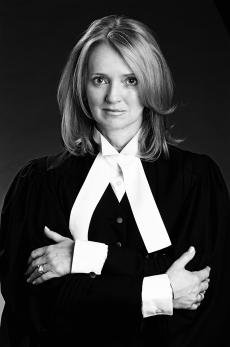 The Ontario Court of Appeal recently reversed a Hague Convention order that a mother from England must return to England with her two children, failing which her British husband would have custody of their children. (Zafar v. Saiyid (2018) ONCA 352)
The Ontario Court of Appeal recently reversed a Hague Convention order that a mother from England must return to England with her two children, failing which her British husband would have custody of their children. (Zafar v. Saiyid (2018) ONCA 352)
As is becoming typical in Hague cases, the mother and her two young children who had Canadian citizenship,travelled to Canada for a summer holiday, with the permission of her spouse, and the intention of returning to England by a prescribed date.
On August 23, the mother advised the children’s father that their marriage was over and that she would remain in Ontario with the children. He promptly filed a Hague Convention application seeking the return of the children.
At the court hearing the mother conceded that the children’s habitual residence was England, which is the primary question when a Hague application is brought. The law is very clear that children must be returned to their habitual residence where the question of their residence will be determined.
However, Article 13 (b) of the Hague Convention permits a removing parent to argue that the child should not be returned where the other parent poses a grave risk of physical or psychological harm to the child or the spouse. Ms. Saiyid alleged that her husband was “threatening, verbally abusive, financially controlling” and presented “intolerable behaviour towards the mother, smoke and drank”, which reflected an inability to create ” a safe environment free of danger for the children.”
The hearing judge ordered the mother to return the children to England by December 1, failing which the children’s father would have sole custody of the children. He said:
“In a Hague application, I am not to determine the best interests of the children, only jurisdiction. In any event, on affidavits I cannot determine who is telling the truth about Mr. Zafar’s conduct.”
On November 27 the mother obtained a stay of the judge’s order, however, shortly thereafter she voluntarily returned to England with the children and brought an application to the British court seeking orders that she may relocate to Canada with the children.
Nonetheless, she wished to continue with her appeal in Ontario on the basis that the judge’s alleged errors of law could be used against her in the new British proceeding.
The appeal court agreed that her appeal was not moot for the reason she identified and held that the hearing judge erred in stating that he could not determine whether the children were at grave risk of serious harm, delegating that issue to the English courts. The court held that the hearing judge ought to have made a decision based on the record; or considered whether it was appropriate to hear oral evidence from the parties. The hearing judge’s decision to explicitly decline to consider the matter was an error in law.
While the task is enormous, where conduct allegations are thrown back and forth haphazardly, it is a judge’s duty to sift the wheat from the chaff. Oral evidence, with cross-examination is often the best way of doing that. These cases are the most difficult, particularly when young children are involved, when the question becomes “which parent is most believable?”
Lawdiva aka Georgialee Lang
 It is not unusual, especially in family law cases, to have a judge conclude a hearing with the phrase “I will seize myself of this case”. What that means is that the judge has decided that it is reasonable, necessary, or simply prudent for him or her to hear all future court applications regarding the case.
It is not unusual, especially in family law cases, to have a judge conclude a hearing with the phrase “I will seize myself of this case”. What that means is that the judge has decided that it is reasonable, necessary, or simply prudent for him or her to hear all future court applications regarding the case.  If you are a litigator in Canada you should know the name “Joe Groia”. He is a masterful legal advocate from Ontario who specializes in securities law. His prominence in the legal profession was capped this week when Groia v. The Law Society of Upper Canada (now the Law Society of Ontario) was argued before the Supreme Court of Canada. (Law Society of Upper Canada v. Joseph Peter Paul Groia, 2012 ONLSHP 94)
If you are a litigator in Canada you should know the name “Joe Groia”. He is a masterful legal advocate from Ontario who specializes in securities law. His prominence in the legal profession was capped this week when Groia v. The Law Society of Upper Canada (now the Law Society of Ontario) was argued before the Supreme Court of Canada. (Law Society of Upper Canada v. Joseph Peter Paul Groia, 2012 ONLSHP 94)  An Ontario judge has spoken out clearly about counsel who book trials and then abandon them on short notice to the courts. In Armstrong v. Armstrong, 2017 ONSC 6568, Mr. Justice Pazaratz called the case, involving a reduction or termination of spousal support, only to learn that the litigants in the case were not available, and an adjournment was sought by both counsel.
An Ontario judge has spoken out clearly about counsel who book trials and then abandon them on short notice to the courts. In Armstrong v. Armstrong, 2017 ONSC 6568, Mr. Justice Pazaratz called the case, involving a reduction or termination of spousal support, only to learn that the litigants in the case were not available, and an adjournment was sought by both counsel. Clients often wonder what they should wear to court. I usually tell them that “business casual” is acceptable, but jackets and ties are never out of place. On more than a few occasions an in-person litigant has been so well dressed that the judge assumes he/she is a lawyer. Looking around at certain lawyers’ attire, I am not sure that is a compliment!
Clients often wonder what they should wear to court. I usually tell them that “business casual” is acceptable, but jackets and ties are never out of place. On more than a few occasions an in-person litigant has been so well dressed that the judge assumes he/she is a lawyer. Looking around at certain lawyers’ attire, I am not sure that is a compliment!  In yet another British Columbia Supreme Court case, a wise judge points out the folly of the battle between litigating spouses and the accompanying expense, both financially and emotionally.
In yet another British Columbia Supreme Court case, a wise judge points out the folly of the battle between litigating spouses and the accompanying expense, both financially and emotionally.  In a groundbreaking decision last summer after a 147 day trial, Mr. Justice Paul Walker of the British Columbia Supreme Court found that B.C.’s child protection authorities had negligently permitted a father to sexually abuse his children while the youngsters were in the custody of the Ministry. The Court found that the government’s failure to protect the children was “egregious, negligent, and a breach of duty” and government social workers showed a “reckless disregard to their obligation to protect children.”
In a groundbreaking decision last summer after a 147 day trial, Mr. Justice Paul Walker of the British Columbia Supreme Court found that B.C.’s child protection authorities had negligently permitted a father to sexually abuse his children while the youngsters were in the custody of the Ministry. The Court found that the government’s failure to protect the children was “egregious, negligent, and a breach of duty” and government social workers showed a “reckless disregard to their obligation to protect children.”